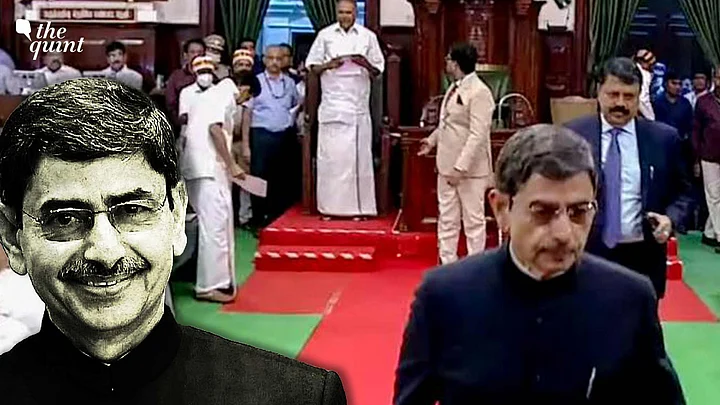You can picture it as a keen sporting contest.
If it was not the Tamil Nadu Assembly Building at the majestic Fort St George but the Chidambaram Stadium down the seashore in Chennai, you can imagine State Governor RN Ravi as a quirky batsman and the ruling DMK as a strong fielding team.
What happened on Monday at the assembly with the governor's traditional speech at the start of a session, was a sight to watch. In skipping some carefully crafted lines extolling the DMK 's 'Dravida model" and its ideological origins, Ravi played a political shot linked to his allegiance to the Hindutva ideology of the RSS-inspired nationalist leadership of Prime Minister Narendra Modi's BJP.
However, Assembly Speaker M Appavu read out in Tamil, the full text drafted by the State cabinet like an alert wicketkeeper and Chief Minister M K Stalin sharp as a first slip fielder, moved fast in tandem. The assembly quickly passed an affirmative resolution to retain on record, the printed version, to snub the governor. A visibly surprised Ravi quickly walked out like a caught-out batsman walking to the pavilion.
Governors As Centre’s Mouthpieces: A Tale That Repeats Itself
But what happened in Chennai was certainly not cricket, to stretch the metaphor given by British rulers who also left for India a parliamentary system of governance complicated by an imperial design.
Ravi's brazen defiance of the Constitutional procedure to read out verbatim— the speech passed by the elected government was no casual oversight or a matter of printed speech 'taken as read'. It was the latest in a series of run-ins between the DMK and its spunky opposition to the RSS worldview.
Such a conflict based on ideological disagreements is normal in a democracy but not when inter-party differences are played out in violation of governance procedures. At the core of it all, are questions on the limits and duties of the governor.
Ravi has been dragging his feet on approving legislative bills passed by the elected DMK government, entertaining politically inclined visitors at the Raj Bhavan as if he was a super CM, and touring the state to make speeches that clearly drive the Hindutva ideology.
Leaving little to the imagination, reports emanating from the Raj Bhavan after the assembly fracas said the governor deliberately omitted contentious paras in his ceremonial speech as they spoke in favour of the Dravidian ideology.
That's exactly the point. Ideological clashes and political speeches by ruling governments are normal in multi-party democracies in the modem world. But Governor Ravi seems to have a problem with both ideological variety and modernity. He lives mostly in the past, affirming traditions and monochromatic saffron hues of thought as if to suggest that opposing the BJP is tantamount to opposing the nation.
Similar Tug of War Witnessed in Other States
The DMK believes in national unity based on constitutional values and this flies in the tradition-bound 'Ancient Motherland' ideas that Ravi is fond of. In airing his differences, he has come to the point where he is violating his duty largely as a ceremonial officer under the Constitution. His recent suggestion to rename Tamil Nadu (Tamil country) as Tamizhagam (Tamil home) is a matter of mere semantics but aimed at de-fanging the DMK's claim to be a custodian of Tamil culture.
Things are such that it won't be a surprise if the assembly clash lands in the Supreme Court of India as constitutional matters often do because some issues are stipulated by law and others by convention or common sense.
Ravi's conduct is not a one-off oddity. BJP-appointed governors in West Bengal, Kerala, Maharashtra, and Puducherry have also routinely clashed with elected local governments, indicating an ideological or political design that defies democratic convention.
Abuse of the governor's office was rampant during Prime Minister Indira Gandhi's reign, often on flimsy grounds ostensibly linked to law and order or national security. Modi's BJP is only taking a leaf out of the playbook now mothballed by his main opposition Congress party.
What is special in Governor Ravi's conduct is that the lines he skipped in a wilful error of omission include praise for Dr Babasaheb Ambedkar, officially the chief architect of the Constitution.
Social justice is not a favourite phrase for the BJP and Ravi, a former IPS officer, sees himself not as a rubber-stamping dignitary but a supercop on ideological vigil. In contrast, it is perfectly fine in a democratic society for politically opposite ideologies to coexist as long as they are bound by a shared adherence to the Constitution.
Notably, however, Article 163 of the Constitution, described by critics as a British era relic, gives the governor an extra discretion including a caveat that the office shall not be questioned in courts, although there are other words that might suggest room for interpretation.
Can the SC Come to the Rescue of Tamil Nadu’s Political Roadblock?
Such viceregal powers conferred on the governor may yet give the current TN governor a return to the crease in a judicial action replay. However, Article 163 notes that the state council of ministers are supposed to assist the governor in the exercise of his functions— “except in so far as he is by or under this Constitution required to exercise his functions or any of them in his discretion.” That does seem to leave room for the Supreme Court to interpret the situation in a manner that may overturn British-era practices.
As of now, there is only a political logjam of the kind we have already seen in Kerala with governor Arif Mohammed Khan involved in clashes with the communist government led by Chief Minister Pinarayi Vijayan.
But all indications are that events in Tamil Nadu and Kerala smell of a constitutional crisis that can only be resolved by the Supreme Court.
(The writer is a senior journalist and commentator who has worked for Reuters, Economic Times, Business Standard, and Hindustan Times. He can be reached on Twitter @madversity)
